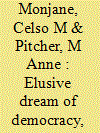|
|
|
Sort Order |
|
|
|
Items / Page
|
|
|
|
|
|
|
| Srl | Item |
| 1 |
ID:
185761


|
|
|
|
|
| Summary/Abstract |
The 1992 peace accords ending a 16-year civil war, followed by the 1994 democratic elections, promised a brighter political and economic future for Mozambique. Despite the adoption of multiparty politics and robust economic growth since the 1990s, however, Mozambique today faces seemingly intractable challenges. Amid increasing allegations of electoral fraud, Frelimo continues to be the country’s ruling party, a position it assumed after independence in 1975. Political insiders control most of the country’s considerable economic assets, including vast natural gas deposits in the north. A violent jihadi insurgency, which began in the northern province of Cabo Delgado in 2017 and tapped into local grievances, has so far resisted the combined efforts of the national military, regional security forces, and a contingent of troops from Rwanda to eliminate it. With spaces for peaceful civic participation and action shrinking, the glimmer of hope for democracy, security, and well-being in Mozambique is fading.
|
|
|
|
|
|
|
|
|
|
|
|
|
|
|
|
| 2 |
ID:
174648


|
|
|
|
|
| Summary/Abstract |
Mozambique’s 2019 elections resulted in a landslide victory for the incumbent Frelimo party, but they were also characterized by unprecedented levels of election related violence and other irregularities. The briefing demonstrates that polarization, which has been a common feature of Mozambican politics since independence, has become more pernicious at least since 2013. As is the case in other countries, pernicious polarization is contributing to rising authoritarianism in Mozambique. The briefing traces the roots of pernicious polarization, its shifting dynamics over the last several years, and its impact on the exercise of democratic rights in Mozambique’s recent elections.
|
|
|
|
|
|
|
|
|
|
|
|
|
|
|
|
|
|
|
|
|